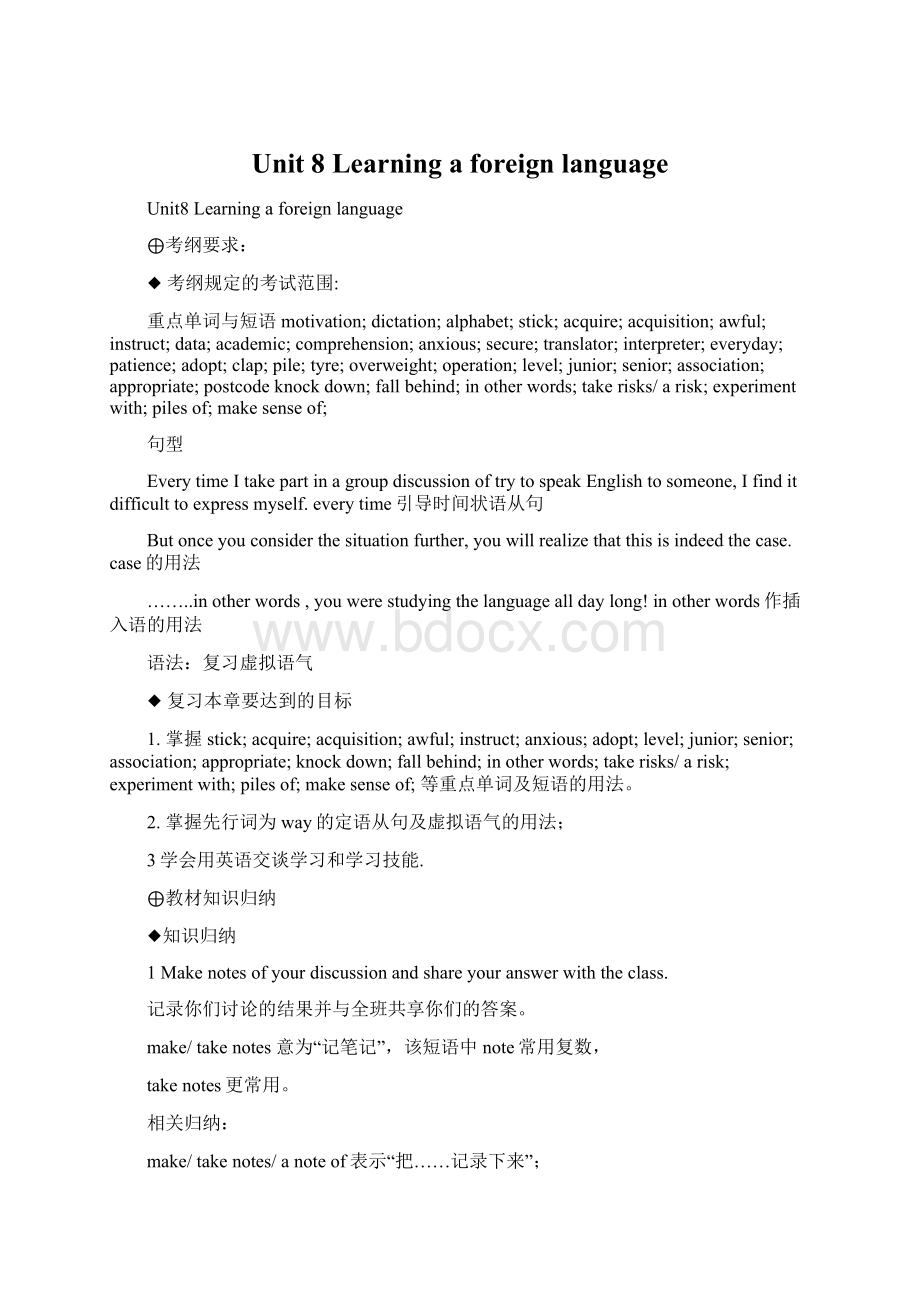Unit 8 Learning a foreign languageWord下载.docx
《Unit 8 Learning a foreign languageWord下载.docx》由会员分享,可在线阅读,更多相关《Unit 8 Learning a foreign languageWord下载.docx(18页珍藏版)》请在冰豆网上搜索。

experimentwith;
pilesof;
makesenseof;
句型
EverytimeItakepartinagroupdiscussionoftrytospeakEnglishtosomeone,Ifinditdifficulttoexpressmyself.everytime引导时间状语从句
Butonceyouconsiderthesituationfurther,youwillrealizethatthisisindeedthecase.case的用法
……..inotherwords,youwerestudyingthelanguagealldaylong!
inotherwords作插入语的用法
语法:
复习虚拟语气
◆复习本章要达到的目标
1.掌握stick;
knockdown;
等重点单词及短语的用法。
2.掌握先行词为way的定语从句及虚拟语气的用法;
3学会用英语交谈学习和学习技能.
⊕教材知识归纳
◆知识归纳
1Makenotesofyourdiscussionandshareyouranswerwiththeclass.
记录你们讨论的结果并与全班共享你们的答案。
make/takenotes意为“记笔记”,该短语中note常用复数,
takenotes更常用。
相关归纳:
make/takenotes/anoteof表示“把……记录下来”;
takenoticeof表示“注意;
留心”,相当于takenoticeof。
Youmusttake/makenotescarefullyinclass.
你上课一定要认真做笔记。
Hetooknotesofeverythingthatshewassaying.
他把她所说的话都记录下来了。
(1)note做名词,还可意为:
“注释;
便条”。
Ileftanotetotellhim,sayingIwouldcomeat6p.m.
我给他留下便条告诉他我下午6点来。
(2)note还可做动词,意为“记下;
摘下;
注意;
注意到”。
Pleasenotehowthemachineisoperated.
清注意机器的操作方法。
(3)notedfamous做形容词,意为“著名的;
知名的”,相当于famous。
Heisanotedwriter.
他是一位著名的作家。
2.ReadingsomethinginEnglish,IalwaysgetstuckwhenIcomeacrossanewword.
stick的用法:
(1)vt.刺;
戮;
Don’tstickpinsintothechair!
别把别针插入椅子里!
钉住;
插牢
粘贴;
张贴
Theystuckthenoticeonthewall.
他们把通知贴在墙上。
伸,伸出
Don'
tstickyourheadoutofthetrainwindow.
不要把头伸出火车窗外面。
(通常用于疑问句和否定句)容忍,忍受+v-ing
Ican'
tsticksuchpeople.
我无法容忍那种人。
使停止;
阻塞
Thecarwasstuckinthesnow.
那辆小汽车陷入雪中。
vi.
粘住;
钉住
Severalpageshavestucktogether.
几页纸粘在一起了。
Thisstampwon'
tstick.
这张邮票贴不上。
陷住;
梗塞;
被困住
Afish-bonestuckinhisthroat.
他喉咙里卡了一根鱼刺。
伸出;
突出(+from)
What'
sthatstickingoutofyourpocket?
你口袋里伸出来的是什么东西?
(2)做名词,意为“棍;
棒;
手杖”。
Sincetheaccidentshehaswalkedwithastick.
自从那次事故以后她不得不拄着拐杖走路。
3.Iusedtolikeit,butnowIfeelasifI’mnotmakinganyprogress.
.progress不可数名词
短语搭配:
(1)makeprogress进步,前进
Progressisbeingmadeinbuildinganewhighwayaroundthecity.
新环城公路的建设正在向前推进。
(2)inprogress进行中
Themeetingisinprogressnow.
会议正在进行。
Aninquiryisnowinprogress.
调查工作此刻正在进行中。
注意:
progress还可以用作动词“前进,进步,进展”
HeisprogressingnicelyinhisstudyofFrench.
他的法语学习进展顺利。
Herdiseasehasprogressedmorequicklythanthedoctorsexpected.
她的病情发展得比医生们预料的要快。
Theworkisprogressingsteadily.
工作在稳步地取得进展。
4.EverytimeItakepartinagroupdiscussionoftrytospeakEnglishtosomeone,Ifinditdifficulttoexpressmyself.
(1)everytime意为“每次”,相当于eachtime,引导时间状语从句,意为“每当……的时候”。
EverytimehecametoShanghai,hewouldpayavisittoher.
每次他来上海,总要去拜访她。
与everytime用法类似的词语还有:
eachtime,nextminute,theinstant,themoment,thelasttime,thefirsttime,instantly,directly,immediately等也可以引导时间状语从句,表示“一……就”,从句用一般时代替将来时。
ThemomentIseehim,I’lltellhim.
我一见到他就告诉他。
HeleftadeepimpressiononmethefirsttimeImethim.
我第一次见到他时,就给我留下了很深的印象。
Besuretocallonusnexttimeyoucomehere.
下次来这儿请一定来找我们。
(2)find+it+adj./n.+todo…在这句型中,it做形式宾语,形容词或名词做宾补,不定式短语做真正的宾语。
可用于此句型的动词还有think,feel,make,consider等。
HefounditimpossibletofinishtheworkIaday.
他发现在一天内完成那项任务是不可能的。
Weconsidereditagreathonourtohavebeeninvitedhere.
我们认为被邀请到这儿很荣幸。
5.…….perhapsmostpuzzlingofall,howwereweabletomakesenseofwhatweheardanddistinguishthemistakesandfrom“good”language.
makesenseof弄懂…的意思
Ican’tmakesenseofthispoem,butperhapsIwillifIreaditagain.
我弄不懂这首诗的意义,但我再读一遍或许就能读懂了。
makesense有意义,有道理,讲得通
Talkslowly;
you’renotmakingsense.
请讲慢些,你没把意思说清楚。
相关归纳:
(1)havea/nosenseof有/没有……感(觉)
Shehasnosenseoftime.
她没有时间观念。
Yourbrotherhasagoodsenseofhumor.
你兄弟很有幽默感。
Heisfreefromanysenseofresponsibility.
他丝毫没有责任感。
(2)inasense在某种意义上;
在一定程度上
Iwritemanylettersandkeepajournal,soinasenseI’mawriter.
我写许多信并记日记,因此从某种意义上说我就是作家。
(3)innosense决不
(4)cometoone’ssense清醒过来
Shefellandfainted,butsooncametohersenses.
她跌倒后昏过去,但不久就苏醒过来了。
Toomuchbeerandwinewasruininghislife;
hefinallycametohissensesandstopped.
过度饮酒使他的身体每况愈下,他最终明白后便停止了酗酒。
(5)sixsense第六感官
Hissixsensetoldhimthatsomethingwaswrong,andsureenough,hiscarhadbeenstolen.
他的第六感官告诉他出意外事情了。
确实,他的汽车被盗了。
(6)commonsense常识,见识
Showsomecommonsense;
stayhomeifyou’resick.
表现得懂事些,你如果生病了,就呆在家里休息。
6.Butonceyouconsiderthesituationfurther,youwillrealizethatthisisindeedthecase.
case做名词,意为“事例;
实情;
病例;
案件;
箱子”。
Heisatypicalcaseofthedisabledpeoplewhohaveachievedsuccess.
他是取得成功的残疾人中的一个典型的例子。
Therearefivecasesofhighfever.
有五个发精烧的病人。
Hethoughthehadalreadysolvedtheproblem,butthatwasnotthecase.
他以为他已经解决了这个问题,可是实际情况并非如此。
ThecasewastriedlastWednesday.
上星期三审判了该案件。
(1)inthis/thatcase在这种/那种情况下
Inthiscase,let'
sstartearlier.
既然这样,我们就早点开始。
(2)inanycase不管怎样;
无论如何
Inanycase,booktheticketsfirst.
无论如何先把票订好。
(3)innocase决不(置句首时,需用倒装)
Innocaseshallweallowsmokingintheclassroom.
教室里决不允许吸烟。
(4)incaseof如果;
万一
Incaseoffire,ringthealarmbell.
万一发生火灾,拉响警铃。
(5)incase放在句首,引导条件状语从句,意为“假使;
万一;
要是……的话”,放在句中,引导目的状语从句,意为“以防”;
incase还可单独用做状语或引导状语从句,意为“以防万一(以防某种情况)”。
Takeanumbrellawithyouincaseitrains/itshouldrain.
带上雨伞,以防下雨。
7……..inotherwords,youwerestudyingthelanguagealldaylong!
inotherwords:
“换句话说,也就是说.”指用另一种简单的方法或词语来解释同一观点或意见.
Yourperformanceintheexamdidnotreachtherequiredstandard---inotherwords,youfailed.
(1)inaword总之
Inaword,thepartyisover.
一句话,聚会结束了。
(2)inone’sownwords用自己的话说
Tellthecourtwhathappenedinyourownwords.
用你自己的话告诉法庭发生了什么事。
(3)beaman/womanofhis/herword 守信的人,说话算数的人,可靠的人
Sheisawomanofherwordbecausesherepaidtheloanexactlywhenshesaidshewould.
她是个守信的人,按照她说的时间还了贷款。
(4)breakone’sword失信
Hebrokehiswordanddidnotrepaytheloan.
他违背了诺言,没有归还借款。
(5)eatone’swords(被迫)收回某人的话,承认错误
Hekeptsayingthathewouldwinthetennischampionship,buthelostandnowhehastoeathiswords.
他坚持说他能赢得网球赛冠军,但他输了,现在他不得不承认他说错了话。
(6)havewordswith与某人争论,发生口角
Hisbehaviormadememad,soIhadwordswithhim.
他的所为把我气疯了,我跟他吵了一架。
(7)wordforword逐字地,一字不变地
Shetoldmeexactlywhathesaid,wordforword.
她一字不差地告诉我他所说的话。
(8)wordplay双关语
Thewordplayinhiswritingisverywitty.
他作品中的双关语诙谐风趣。
(9)keepone’sword遵守诺言
Youcantrusthertokeepherword.
你可以相信她会信守诺言的。
8.Youdidthisforfiveyears,sothatisawfullotofhours.
awfuladj.
主要用法:
(1)可怕的;
讨厌的(verybad;
unpleasant)
awfulweather/book/food讨厌的天气/书/食物
(2)极大的
anawfullotof极多的,相当于averylargeamountof。
如:
anawfullotofwork相当多的工作
(3)(身体)不舒服的
look/feel/awful相当于look/feelill
“你看起来不舒服”可以用以下句子表达:
Youdon’tlookwelltoday.
Youdon’tfeelquiteyourself.
Youlookawful.
Youlookpale.
派生词:
awfullyadv.非常,很,十分
It’sawfullycold(very).天气真冷。
9.Withgreatercontrolandastrongersenseofachievement,activelearnersareabletoacquirenewskillsfasterandputwhattheyknowtobetteruse.
put…touse=bring…touse意为“加以利用……”,use做名词,常用短语:
makefull/good/littleuseof表示“充分/好好/几乎不利用”。
She’scertainlymadethebestuseofheropportunities.
她确实充分利用了一切机会。
Inmyopinion,it’sthebestusethatcouldbemadeofthemoney.
在我看来,这就是对这笔钱的最好的使用。
与use构成的常用短语和句型还有:
(1)It’snousedoing=It’suselessdoing做……没用处
Itisnousewaitingon,forhewon’tcome.
在等下去是没有用的,因为他不会来的。
(2)beinuse正在被使用;
在使用中
Thistechniqueisstillinwideuse.
这一技术仍被广泛使用。
(3)beofuse=beuseful有用处
(4)comeintouse开始被使用
Thismethodhascomeintowideuseinthisarea.
这方法在这一地区已被广泛使用。
10.Thelessanxiousandmorerelaxedthelearner,thebettertheirlanguageacquisition.
anxiousadj.
(1)anxious做形容词,意为“忧虑的;
焦虑的;
担心的;
渴望的;
急切希望的”,可与介词for,about连用,也可接不定式或that从句。
常用短语:
beanxiousabout表示“为……担忧”;
beanxiousfor表示“渴望(了解)”;
beanxioustodo表示“急于做……”;
beanxiousthat表示“渴望”,从句谓语用(should)do虚拟语气。
Weareanxiousabouthissafety.
我们为他的安全担忧。
Maryhasbeenanxiousforyourreturn.
玛丽急切盼你回来。
Hewasanxiousthatthemeetingonthefollowingdayshouldbeasuccess.
他希望第二天的会议成功。
beeagerfor盼望;
想得到
beworriedabout为……忧虑(着急)
beconcernedabout/for对……担心;
关心
becuriousabout对……好奇
11.Theyaremorewillingtotakerisksandtoplacethemselvesinnewlearningsituation.
takearisk
(1)takearisk意为“冒险”,相当于runarisk或takerisks。
如果表达“冒……之险/冒险做某事”可用短语takeariskofdoingsth。
Youhavetotake/runalotofrisksifyouwanttosucceedinbusiness.
如果想在生意上取得成功,就得冒许多风险。
Idon’twanttorun/taketheriskofmeetingPeter,soI’llstayhere.
我不想冒险碰上彼得,所以我要待在这儿。
(2)risk还可以做动词,意为“冒失去……之险;
使遭爱危险”,后常接名词或动名词做宾语。
Youareriskingyourhealthbysmoking.
抽烟是拿你的健康去冒险。
(1)attheriskof冒……之险
Hesavedmylifeattheriskoflosinghisown.
他冒着生命危险救了我。
(2)atrisk在危险当中
Thediseaseisspreading,andallchildrenunder5areatrisk.
疾病正在蔓延,所有五岁以下的小孩都有被传染的危险。
(3)atone’sownrisk由自己负责
(4)atallrisks=atanyrisk无论冒什么危险;
12.Ifwewanttobecomesuccessfullanguagelearners,weshouldtrytoadoptsomeofthestudyhabitsandcharacteristicsdescribedabove.
adopt:
采取;
采纳;
吸收
Aftermuchdeliberation,thepresidentdecidedtoadopthersuggestion.
总经理再三考虑之后,决定采纳她的建议。
过继,收养(+as)
M